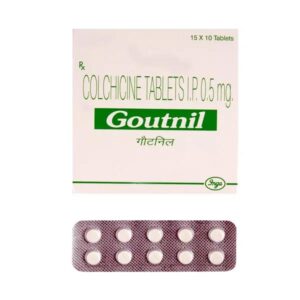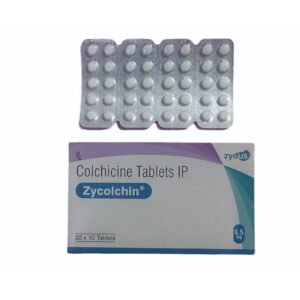COLCHICINE
COLCHICINE: COLCHICINE is a medication primarily used to treat gout and familial Mediterranean fever (FMF). It belongs to a class of drugs called anti-inflammatory agents.
The main mechanism of action of COLCHICINE is its ability to inhibit the migration of white blood cells (neutrophils) to the site of inflammation. The drug disrupts microtubule formation, thereby inhibiting cell division and reducing the inflammatory response.
For gout treatment, COLCHICINE is typically taken at the first sign of an acute gout attack. The usual dose is 1.2 mg initially, followed by another 0.6 mg one hour later. This regimen should not be repeated within 3 days.
For FMF, the recommended maintenance dose of COLCHICINE is usually 0.6 mg to 1.8 mg per day, divided into two or three smaller doses. The dosage may vary based on individual response and severity of symptoms.
As with any medication, COLCHICINE may cause certain side effects. Common side effects may include nausea, vomiting, diarrhea, and abdominal pain. These symptoms are usually mild and subside on their own. However, if they persist or worsen, it is important to consult a healthcare professional.
In some cases, taking a high dose or using colchicine for an extended period can lead to more severe side effects such as muscle weakness, neuropathy, bone marrow suppression, and liver toxicity. These side effects are relatively rare but should be reported to a healthcare provider immediately.
It is worth noting that COLCHICINE can interact with other medications, especially those that affect the liver and kidneys. Therefore, it is important to disclose all medications and medical conditions to the healthcare provider before starting COLCHICINE.
Overall, COLCHICINE is an effective medication for the management of gout and FMF, but it should be used under the supervision and guidance of a healthcare professional.


